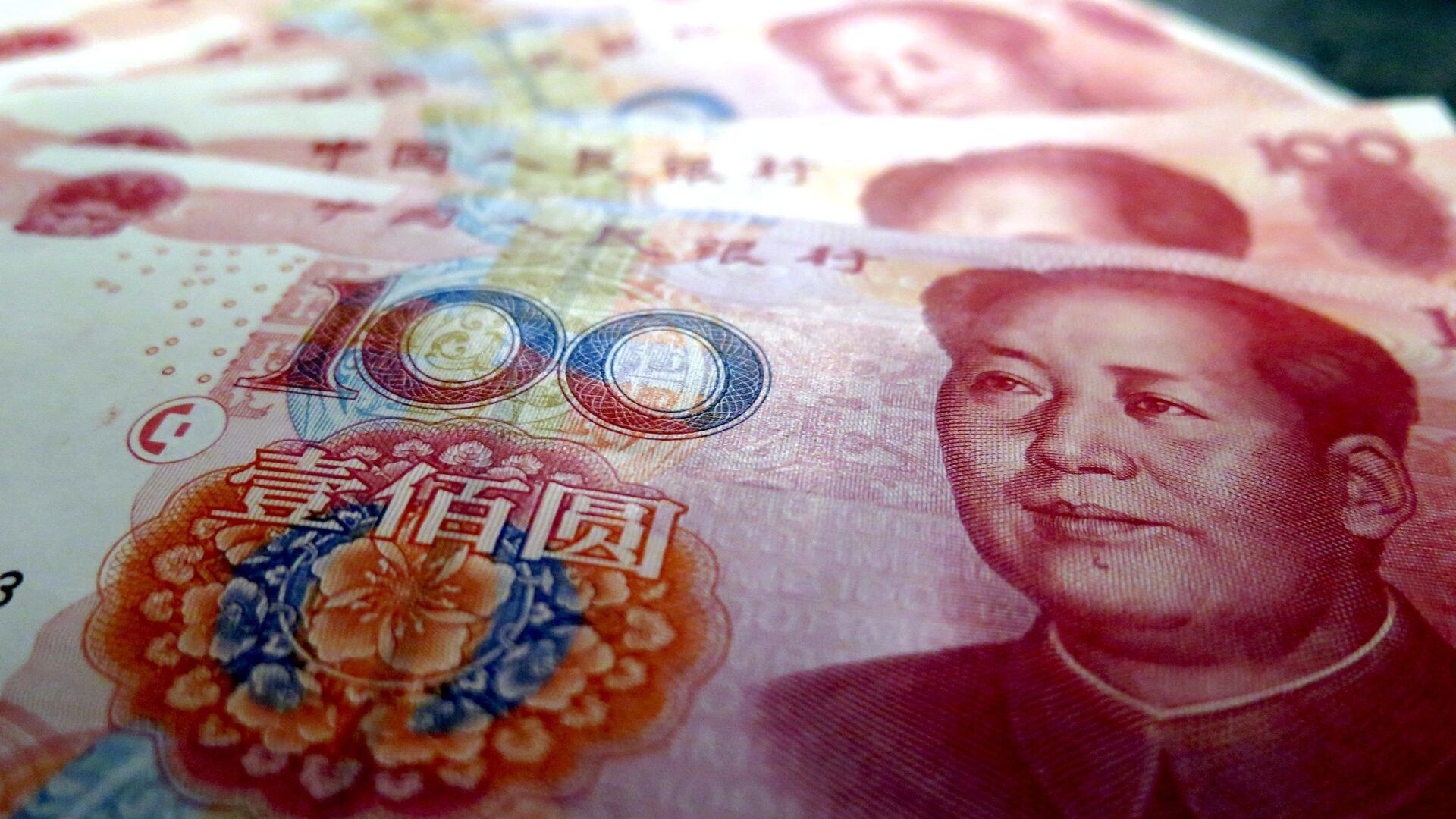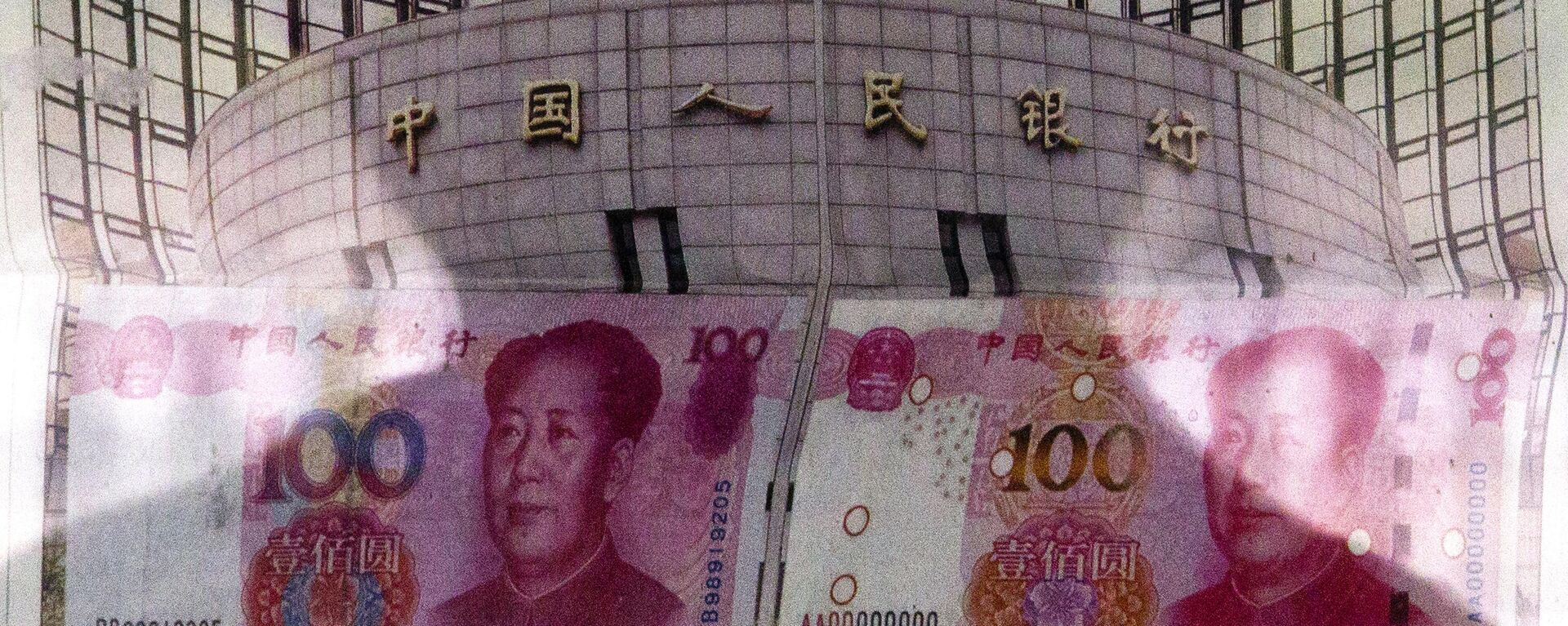https://sputnikglobe.com/20230726/can-foreigners-invest-in-chinese-yuan-1112163801.html
Can Foreigners Invest in Chinese Yuan?
Can Foreigners Invest in Chinese Yuan?
Sputnik International
As China's economy reopens, global investment banks predict its currency to rise in value, attracting foreign investors, who want to diversify their portfolios.
2023-07-26T20:44+0000
2023-07-26T20:44+0000
2023-07-26T20:42+0000
economy
ray dalio
newsfeed
society
china
saudi arabia
russia
asean
hong kong stock exchange
cme
https://cdn1.img.sputnikglobe.com/img/107647/90/1076479074_0:192:2048:1344_1920x0_80_0_0_3292573f0ca1eea2523f08ebb75da1b2.jpg
The Chinese yuan (CNY), also known as renminbi (RMB), holds a crucial position in the global economy as China's economy continues growing in power. Investors globally are increasingly curious about the opportunities associated with how to invest in the RMB yuan.In February, international investment banks projected the Chinese currency would increase in value this year, believing it would attract more foreign direct investments as China's economy reopens and the government relaxes rules on the property market.The bullish forecasts emerged when Beijing ditched its zero-COVID policy in early December and shifted to economic growth-oriented strategies to boost investor confidence and prioritize local demand.De-Dollarization TrendSince the 2008 global financial crisis, there have been repeated predictions about the decline of the US dollar. Reports recently suggested nations are considering ways to establish a "common BRICS currency," as some countries - like Brazil, Saudi Arabia and Russia - are said to be adopting the Chinese yuan for international trade settlements. Although the currency shift has primarily been fueled by repercussions of US-led sanctions against Russia and the increasing distrust of the dollar, increased speculation about de-dollarization has been further exacerbated by a surge in gold deposits by many central banks and the use of currency swaps, among other developments.Why Are People Investing in the Yuan?The RMB's internationalization has gained momentum in recent years, raising prospects of investing in the legal tender.China's central bank announced on May 15 that the percentage of the Chinese yuan in the International Monetary Fund's (IMF) Special Drawing Rights (SDR) basket has climbed from 10.92% to 12.28%, advancing Beijing’s efforts to make renminbi a reserve currency. As China's economy grows, the yuan's global presence is expected to expand, influencing trade and investment patterns in Africa, Latin America and ASEAN countries, among other regions.Ray Dalio, an American investor and co-chief investment officer at Bridgewater Associates, predicts the Chinese yuan will see an uptick in international usage as a weak economy and interest rate hikes impact the US dollar and other major reserve currencies.Dalio highlighted that China's appealing interest rates and the development of its capital markets have played a role in strengthening the yuan's exchange rate.During the last quarter, there was an 11% growth in yuan-denominated payments, totaling $1.51 trillion. In contrast, transactions in US dollars plunged by 14% to $1.4 trillion. The growth marked the first time since 2010 that the currency took the lead in payment data.Several countries such as Russia, Iran, India, Saudi Arabia, Venezuela, and Indonesia have opted to trade oil and other goods with China using the “petro-yuan” momentum. If this trend continues, the volume of trade and RMB yuan-based transactions processed through China's Cross-Border Interbank Payment System might surpass the dollar-based settlement system in global energy and commodity markets.The global recognition of the yuan recieved a lift from the recent introduction of the Hong Kong USD-CNY dual counter model, which permits trading stocks in Hong Kong dollars and Chinese renminbi at the Hong Kong Stock Exchange from June 19 onwards.How to Invest in YuanInvesting in yuan presents a basket of prospects for investors. From stocks and bonds to money market instruments, the Chinese financial markets offer multiple avenues to gain exposure.One yuan investment strategy is through exchange-traded funds (ETFs) designed to track its value. For instance, Invesco’s Yuan Dim Sum Bond Portfolio Fund is an ETF that invests in yuan-renminbi-dominated assets like Dim Sum bonds issued outside mainland China. The fund offers potential benefits like capital appreciation based on the yuan's performance and a yearly dividend yield that could range from 3.5- 4.0%. It also gives you the opportunity for additional gains if the bond values increase. Additionally, investors can participate in Chinese equities listed on international stock exchanges, providing access to some of China's fastest-growing companies.To invest in the Chinese yuan, you have to grow your holding of the legal tender by opening savings or high-yield time deposit accounts at the Bank of China outlets domiciled in cities including New York, Chicago and Los Angeles. The accounts can be funded in US dollars, but the balance will be shown in CNY. If Yuan's value appreciates, the investors can benefit from it and vice versa; however, if they want to take out their money, they need to convert it to USD. For example, with TIAA Bank's WorldCurrency Access Deposit accounts, you can have a bank account using the yuan. The account requires at least $2,500 as an initial deposit and can be used for Individual Retirement Accounts, although there may be a monthly maintenance fee. In regards to withdrawal transactions, individuals can only get it in dollars as the renminbi is considered a non-deliverable currency.Another option is investing in yuan with leverage. The first leverage is by participating in the yuan's movement by trading "currency futures" contracts, otherwise known as agreements to buy or sell a specific amount of yuan at a predetermined price and date in the future. It happens on the Chicago Mercantile Exchange (CME) and is identified by the symbol RMB. The second leverage is to engage in "forex market trading," which stands for the foreign exchange (FX) market. Investors can trade different currencies against each other, including the yuan-renminbi, effectively allowing parties to take advantage of its fluctuations for potential gains.The Yuan's Global Impact Remains AudaciousSeveral emerging economies have reverted to purchasing commodities and other services and are turning away from USD-denominated transactions to yuan. China's Belt and Road Initiative facilitate loans worth billions of dollars but settled in China's currency.Investing in yuan offers a gateway to one of the world's most dynamic economies. With various investment opportunities, investors can diversify their portfolios and potentially benefit from China's economic growth.As China's influence in the global economy continues to grow, the yuan's significance is likely to extend far beyond its borders in the foreseeable future, making it an attractive option for investors seeking exposure to emerging markets.
https://sputnikglobe.com/20230615/de-dollarization-could-happen-much-quicker-than-most-think-1111181972.html
https://sputnikglobe.com/20230725/chinese-banks-offload-huge-dollar-holdings-as-yuan-surges-1112128491.html
https://sputnikglobe.com/20221118/belt-and-road-initiative-helped-keep-asia-europe-ties-intact-amid-ukraine-crisis-researcher-1104409475.html
china
saudi arabia
russia
Sputnik International
feedback@sputniknews.com
+74956456601
MIA „Rossiya Segodnya“
2023
Sputnik International
feedback@sputniknews.com
+74956456601
MIA „Rossiya Segodnya“
News
en_EN
Sputnik International
feedback@sputniknews.com
+74956456601
MIA „Rossiya Segodnya“
Sputnik International
feedback@sputniknews.com
+74956456601
MIA „Rossiya Segodnya“
chinese yuan, renminbi, rmb, invest in yuan, yuan investment opportunities, chinese economy, de-dollarization, brics currency, forex trading, etfs, china's global impact, yuan in international trade, china's economic growth, global trade, internationalization of yuan, cips, chinese financial markets, hong kong dollar-yuan dual counter model, chinese equities, currency futures, forex market, belt and road initiative, emerging markets, global currency landscape, foreign direct investments, international trade patterns, china's legal tender, capital markets development, cny
chinese yuan, renminbi, rmb, invest in yuan, yuan investment opportunities, chinese economy, de-dollarization, brics currency, forex trading, etfs, china's global impact, yuan in international trade, china's economic growth, global trade, internationalization of yuan, cips, chinese financial markets, hong kong dollar-yuan dual counter model, chinese equities, currency futures, forex market, belt and road initiative, emerging markets, global currency landscape, foreign direct investments, international trade patterns, china's legal tender, capital markets development, cny
Can Foreigners Invest in Chinese Yuan?
As China's economy reopens, global investment banks predict its currency will rise in value, attracting foreign investors interested in diversifying their portfolios.
The Chinese yuan (CNY), also known as renminbi (RMB), holds a crucial position in the
global economy as China's economy continues growing in power. Investors globally are increasingly curious about the opportunities associated with how to invest in the RMB yuan.
In February, international investment banks projected the Chinese currency would increase in value this year, believing it would attract more foreign direct investments as
China's economy reopens and the government relaxes rules on the property market.
The bullish forecasts emerged when Beijing ditched its
zero-COVID policy in early December and shifted to economic growth-oriented strategies to boost investor confidence and prioritize local demand.
Since the 2008 global financial crisis, there have been repeated predictions about the decline of the US dollar.
Reports recently suggested nations are considering ways to establish a "
common BRICS currency," as some countries - like Brazil, Saudi Arabia and Russia - are said to be adopting the Chinese yuan for international trade settlements.
Although the currency shift has primarily been fueled by repercussions of US-led
sanctions against Russia and the increasing distrust of the dollar, increased speculation about
de-dollarization has been further exacerbated by a surge in gold deposits by many central banks and the use of currency swaps, among other developments.
Why Are People Investing in the Yuan?
The RMB's internationalization has gained momentum in recent years, raising prospects of investing in the legal tender.
China's central bank announced on May 15 that the percentage of the Chinese yuan in the International Monetary Fund's (IMF)
Special Drawing Rights (SDR) basket has climbed from 10.92% to 12.28%, advancing Beijing’s efforts to make renminbi a reserve currency. As China's economy grows, the yuan's global presence is expected to expand, influencing trade and investment patterns in Africa, Latin America and ASEAN countries, among other regions.
"The growth of yuan payments value shows that other countries are increasingly diversifying currencies for trade settlement amid global economic and financial instability," Li Yong, deputy chairman of the Expert Committee of the China Association of International Trade, said.
Ray Dalio, an American investor and co-chief investment officer at Bridgewater Associates, predicts the Chinese yuan will see an uptick in international usage as a weak economy and interest rate hikes impact the US dollar and other major reserve currencies.
Dalio highlighted that China's appealing interest rates and the development of its capital markets have played a role in strengthening the yuan's exchange rate.
During the last quarter, there was an 11% growth in yuan-denominated payments, totaling $1.51 trillion. In contrast, transactions in US dollars plunged by 14% to $1.4 trillion. The growth marked the first time since 2010 that the currency took the lead in payment data.
Several countries such as Russia, Iran, India, Saudi Arabia, Venezuela, and Indonesia have opted to trade oil and other goods with China using the “
petro-yuan” momentum. If this trend continues, the volume of trade and RMB yuan-based transactions processed through China's Cross-Border Interbank Payment System might surpass the dollar-based settlement system in global energy and commodity markets.
The global recognition of the yuan recieved a lift from the recent introduction of the Hong Kong USD-CNY dual counter model, which permits trading stocks in Hong Kong dollars and Chinese renminbi at the Hong Kong Stock Exchange from June 19 onwards.
Investing in yuan presents a basket of prospects for investors. From stocks and bonds to money market instruments, the Chinese financial markets offer multiple avenues to gain exposure.
One yuan investment strategy is through exchange-traded funds (ETFs) designed to track its value. For instance, Invesco’s Yuan
Dim Sum Bond Portfolio Fund is an ETF that invests in yuan-renminbi-dominated assets like Dim Sum bonds issued outside mainland China. The fund offers potential benefits like capital appreciation based on the yuan's performance and a yearly dividend yield that could range from 3.5- 4.0%. It also gives you the opportunity for additional gains if the bond values increase.
Additionally, investors can participate in
Chinese equities listed on international stock exchanges, providing access to some of China's fastest-growing companies.
To invest in the Chinese yuan, you have to grow your holding of the legal tender by opening savings or high-yield time deposit accounts at the Bank of China outlets domiciled in cities including New York, Chicago and Los Angeles. The accounts can be funded in US dollars, but the balance will be shown in CNY.
If Yuan's value appreciates, the investors can benefit from it and vice versa; however, if they want to take out their money, they need to convert it to USD. For example, with TIAA Bank's WorldCurrency Access Deposit accounts, you can have a bank account using the yuan. The account requires at least $2,500 as an initial deposit and can be used for Individual Retirement Accounts, although there may be a monthly maintenance fee. In regards to withdrawal transactions, individuals can only get it in dollars as the renminbi is considered a non-deliverable currency.
Another option is investing in yuan with leverage. The first leverage is by participating in the yuan's movement by trading "currency futures" contracts, otherwise known as agreements to buy or sell a specific amount of yuan at a predetermined price and date in the future. It happens on the Chicago Mercantile Exchange (CME) and is identified by the symbol RMB.
The second leverage is to engage in "
forex market trading," which stands for the foreign exchange (FX) market. Investors can trade different currencies against each other, including the yuan-renminbi, effectively allowing parties to take advantage of its fluctuations for potential gains.
The Yuan's Global Impact Remains Audacious
Several emerging economies have reverted to purchasing commodities and other services and are turning away from USD-denominated transactions to yuan. China's
Belt and Road Initiative facilitate loans worth billions of dollars but settled in China's currency.
![A man stands near ]a mural depicting the ancient Silk Road during the Second Belt and Road Forum In Beijing on Friday, April 26, 2019 A man stands near ]a mural depicting the ancient Silk Road during the Second Belt and Road Forum In Beijing on Friday, April 26, 2019 - Sputnik International, 1920, 18.11.2022](https://cdn1.img.sputnikglobe.com/img/07e6/09/0d/1100711857_0:296:3072:1525_1920x0_80_0_0_1678d8679eef02bbb915b620830055a5.jpg)
18 November 2022, 18:44 GMT
Investing in yuan offers a gateway to one of the world's most dynamic economies. With various investment opportunities, investors can diversify their portfolios and potentially benefit from China's economic growth.
As China's influence in the global economy continues to grow, the yuan's significance is likely to extend far beyond its borders in the foreseeable future, making it an attractive option for investors seeking exposure to emerging markets.




![A man stands near ]a mural depicting the ancient Silk Road during the Second Belt and Road Forum In Beijing on Friday, April 26, 2019 A man stands near ]a mural depicting the ancient Silk Road during the Second Belt and Road Forum In Beijing on Friday, April 26, 2019 - Sputnik International, 1920, 18.11.2022](https://cdn1.img.sputnikglobe.com/img/07e6/09/0d/1100711857_0:296:3072:1525_1920x0_80_0_0_1678d8679eef02bbb915b620830055a5.jpg)
